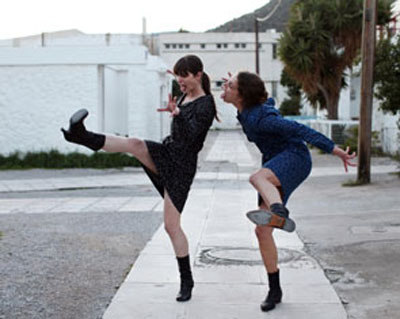Attenberg | reviews, news & interviews
Attenberg
Attenberg
A study of a woman's alienation, rich with peculiarity and pathos

In Attenberg Greek director Athina Rachel Tsangari illustrates that there is no species on earth more peculiar than man. A hit at the 67th Venice International Film Festival, where its lead Ariane Labed rightfully claimed Best Actress, it is on first inspection something of a hodgepodge. On the one hand it’s a quietly confounding and deeply moving study of a woman’s alienated (and almost alien) existence and, on the other, it’s a joyously infantile amusement.
Marina (Labed) is a 23-year-old curiosity, living in a prototype Greek factory town. She is attractive but socially inexperienced to the point of abundant oddness. We first encounter her as she locks tongues with her best friend, Bella (Evangelia Randou), who is giving her a kissing tutorial - though to be honest neither seems to know what they are doing. When Bella asks her rather soberly whether she’s enjoying the experience, Marina answers with equal solemnity, “I’ve never had something wriggling in my mouth before.” Their clumsy efforts (unsurprisingly replicated for the film’s promotional material, see picture above) make for a provocative and tonally unusual opening.
The title Attenberg comes from Bella’s mispronunciation of Sir David Attenborough, of whom Marina is an enthusiastic devotee. Marina watches his wildlife documentaries with her ailing father, Spyros (Vangelis Mourikis), who is receiving treatment for an unnamed but life-threatening condition. Like Attenborough and his animals, Marina seems to view human behaviour at a curious remove. It’s endearingly childlike but it’s also almost as if she’s learning about humans for the first time; she’s wide-eyed, inappropriate, frigid and baffled. She often resorts to (really quite good) impersonations of animals, as if she can’t express herself fully through human means.
It’s a film which often teeters on the brink of - or dives into – taboos; for example, Marina asks her father whether he has ever thought of her naked. Luckily his calm response is, “A father’s mind represses such thoughts about his own daughter.” There’s a fair amount of sex but it’s all deeply blundering and deliberately unerotic. The uncomfortableness of such sequences is enhanced by the eerie stillness of the setting. The opening shots of the town recall Lynch’s Blue Velvet (1986), with its corrupted suburban idyll. However, rather than a severed ear laying nightmarishly amidst the grass, Tsangari chooses pumping electro-rock to undermine and satirise the prosaic images of local landmarks, none of which features a living soul.
 Perhaps most unusually, Attenberg is punctuated by moments where Marina and Bella gad theatrically and in perfect synchronicity about town (a bit like Monty Python’s "Ministry of Silly Walks"), dressed in matching outfits of different colours. They clomp, kick up their heels, scuttle and snarl – taking a stand against their uneventful, uniform surroundings, empowering and distinguishing themselves through their creativity and rebellion. One of these such instances even takes the form of a glorious musical interlude. The girls teach themselves Françoise Hardy’s “Tous les garçons et les filles” before giving it a public airing as they stroll in the rain alongside the town’s tennis courts, whilst the original version belts out on the soundtrack.
Perhaps most unusually, Attenberg is punctuated by moments where Marina and Bella gad theatrically and in perfect synchronicity about town (a bit like Monty Python’s "Ministry of Silly Walks"), dressed in matching outfits of different colours. They clomp, kick up their heels, scuttle and snarl – taking a stand against their uneventful, uniform surroundings, empowering and distinguishing themselves through their creativity and rebellion. One of these such instances even takes the form of a glorious musical interlude. The girls teach themselves Françoise Hardy’s “Tous les garçons et les filles” before giving it a public airing as they stroll in the rain alongside the town’s tennis courts, whilst the original version belts out on the soundtrack.
Comparisons to the excellent Dogtooth (2009) - on which Tsangari was an associate producer - are inevitable and no doubt will do it no harm. In fact Dogtooth’s director, Giorgos Lanthimos, appears in this film as an engineer with whom Marina has a series of awkward sexual encounters (at one point he implores her hilariously, “I beg you, please stop describing what you are doing”).
However, while Dogtooth contextualised its madness, explaining the siblings’ ignorance through their isolation and their father’s deception, in Attenberg we’re not given enough information to confidently interpret what has left Marina this way. She’s motherless but seems to have an honest and open relationship with her father. It makes for a very different, perhaps less immediately satisfying experience. Ultimately though, it’s the more emotionally engaging film as Ariane Labed does a superb job rendering Marina believable and sympathetic, even if she’s a little mysterious. Furthermore, the sequences between father and daughter are heartbreaking and rich with pathos.
Attenberg wears its bizarreness like a badge of honour, but in parts it’s also surprisingly affecting and tender. And, like Marina and Bella’s walks on the wild side, it’s a bit random but also delightfully impudent, with a heel-kicking sense of fun.
Explore topics
Share this article
The future of Arts Journalism
You can stop theartsdesk.com closing!
We urgently need financing to survive. Our fundraising drive has thus far raised £49,000 but we need to reach £100,000 or we will be forced to close. Please contribute here: https://gofund.me/c3f6033d
And if you can forward this information to anyone who might assist, we’d be grateful.

Subscribe to theartsdesk.com
Thank you for continuing to read our work on theartsdesk.com. For unlimited access to every article in its entirety, including our archive of more than 15,000 pieces, we're asking for £5 per month or £40 per year. We feel it's a very good deal, and hope you do too.
To take a subscription now simply click here.
And if you're looking for that extra gift for a friend or family member, why not treat them to a theartsdesk.com gift subscription?
more Film
 Can I get a Witness? review - time to die before you get old
Ann Marie Fleming directs Sandra Oh in dystopian fantasy that fails to ignite
Can I get a Witness? review - time to die before you get old
Ann Marie Fleming directs Sandra Oh in dystopian fantasy that fails to ignite
 Happyend review - the kids are never alright
In this futuristic blackboard jungle everything is a bit too manicured
Happyend review - the kids are never alright
In this futuristic blackboard jungle everything is a bit too manicured
 Robert Redford (1936-2025)
The star was more admired within the screen trade than by the critics
Robert Redford (1936-2025)
The star was more admired within the screen trade than by the critics
 Blu-ray: The Sons of Great Bear
DEFA's first 'Red Western': a revisionist take on colonial expansion
Blu-ray: The Sons of Great Bear
DEFA's first 'Red Western': a revisionist take on colonial expansion
 Spinal Tap II: The End Continues review - comedy rock band fails to revive past glories
Belated satirical sequel runs out of gas
Spinal Tap II: The End Continues review - comedy rock band fails to revive past glories
Belated satirical sequel runs out of gas
 Downton Abbey: The Grand Finale review - an attemptedly elegiac final chapter haunted by its past
Noel Coward is a welcome visitor to the insular world of the hit series
Downton Abbey: The Grand Finale review - an attemptedly elegiac final chapter haunted by its past
Noel Coward is a welcome visitor to the insular world of the hit series
 Islands review - sunshine noir serves an ace
Sam Riley is the holiday resort tennis pro in over his head
Islands review - sunshine noir serves an ace
Sam Riley is the holiday resort tennis pro in over his head
 theartsdesk Q&A: actor Sam Riley on playing a washed-up loner in the thriller 'Islands'
The actor discusses his love of self-destructive characters and the problem with fame
theartsdesk Q&A: actor Sam Riley on playing a washed-up loner in the thriller 'Islands'
The actor discusses his love of self-destructive characters and the problem with fame
 Honey Don’t! review - film noir in the bright sun
A Coen brother with a blood-simple gumshoe caper
Honey Don’t! review - film noir in the bright sun
A Coen brother with a blood-simple gumshoe caper
 The Courageous review - Ophélia Kolb excels as a single mother on the edge
Jasmin Gordon's directorial debut features strong performances but leaves too much unexplained
The Courageous review - Ophélia Kolb excels as a single mother on the edge
Jasmin Gordon's directorial debut features strong performances but leaves too much unexplained
 Blu-ray: The Graduate
Post #MeToo, can Mike Nichols' second feature still lay claim to Classic Film status?
Blu-ray: The Graduate
Post #MeToo, can Mike Nichols' second feature still lay claim to Classic Film status?

Add comment